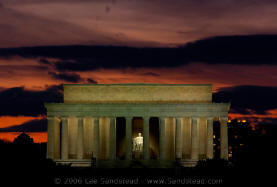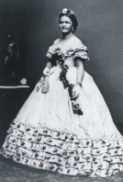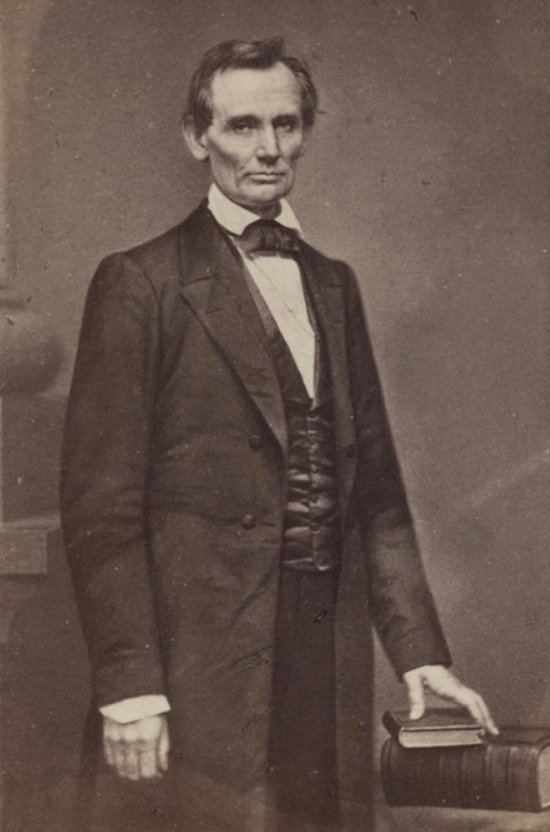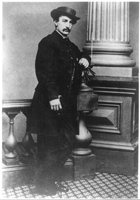Historians say they discovered new artifacts and documents regarding
the young Abraham Lincoln.
 See what you think.
See what you think.
Abraham
Lincoln's Strengths
Lincoln was a gifted politician and famous
for his speeches.
Go here for the
 Abraham Lincoln Speech Collection.
Abraham Lincoln Speech Collection.
Abraham Lincoln also had the reputation of being respectful and
fair.


Abraham Lincoln and
his Signature
Abraham Lincoln and
Slavery
Although he was against slavery,
Lincoln stated in 1858, in his
speech at Charleston, Illinois,
"I will say then that I am not, nor
ever have been, in favor of bringing about in any way the social and
political equality of the white and black races."
Abraham Lincoln Places
to Visit
You can visit the
 Abraham Lincoln
Birthplace National Historic Site in Kentucky.
Abraham Lincoln
Birthplace National Historic Site in Kentucky.
Then there is of course the
 Lincoln
National Memorial in Washington DC.
Lincoln
National Memorial in Washington DC.
Click on the image below to see some excellent shots of
the Lincoln Memorial provided by art historian
 Lee Sandstead.
Lee Sandstead.

LINCOLN NATIONAL MEMORIAL
WASHINGTON DC
Abraham Lincoln's
Family
Abraham Lincoln's father was
Thomas Lincoln.
His mother was Nancy
Hanks.
Nancy died in 1818.
Actor Tom Hanks might or might not be related to
the 16th US President.
Abraham Lincoln's stepmother was
Sarah Bush
Johnston (widowed), who had two girls and a boy of her own.
Abraham's siblings were Sarah and
Thomas.
In 1842, Abraham Lincoln married
 Mary Todd.
Mary Todd.

MARY TODD LINCOLN
1818 - 1882
Their children were
Robert Todd, Edward Baker,
William Wallace, and
Thomas ("Tad").
Abraham Lincoln's
Early Years
Abe Lincoln grew up in Kentucky on the American frontier.
And, for all
you whiskey lovers, Abe grew up at the Knob Creek farm.
Here you
can read
 Abraham Lincoln's Role in Bourbon History. Great little
article.
Great little whiskey, too. Very smooth.
Abraham Lincoln's Role in Bourbon History. Great little
article.
Great little whiskey, too. Very smooth.
Abe Lincoln's family
was poor. They relocated first to Indiana and then to Illinois. He
received little formal education but eagerly taught himself. Abe
worked a wide variety of jobs, including rail splitting. Hence his
nickname The Rail-Splitter.
What in the World is a
Rail-Splitter?
A rail-splitter is a
laborer who splits logs to build split-rail fences.
Abraham Lincoln & the
Black Hawk War
Lincoln enlisted as volunteer for the
Black Hawk War, but his company did not see
battle.
Abraham Lincoln began to study law and decided to go into politics. He was
elected to a seat in the Illinois State Legislature and served four
successive terms.
Lincoln passed the Illinois bar and became a
sought-after attorney, representing banks, insurance companies, and
the Illinois Central Railroad.
On June 16, 1858, at the Republican State Convention held at
Springfield, Illinois, Abraham Lincoln was nominated to run against
Democrat Senator Stephen A. Douglas, who ran for re-election.
Lincoln's acceptance speech at the end of this convention is also
called the
 A House Divided Speech.
A House Divided Speech.
On July 24, 1858, Lincoln wrote a letter to Douglas, inviting him to
a series of debates. It followed seven Lincoln-Douglas Debates,
which took
place on:
August 21, 1858
August 27, 1858
September 15, 1858
September 18, 1858
October 7, 1858
October 13, 1858 and
October 15, 1858.
Although defeated for senator by a vote
of 54 to 46 on January 5, 1859, Lincoln was nominated for president
on May 18, 1860.
One of the main reasons for Lincoln's
nomination was his
 Cooper Union Address, which he had delivered in lower
Manhattan on February 27, 1860, and which was exceptionally well
received by the 1,500 persons in the audience.
Cooper Union Address, which he had delivered in lower
Manhattan on February 27, 1860, and which was exceptionally well
received by the 1,500 persons in the audience.

ABRAHAM
LINCOLN'S COOPER UNION PORTRAIT
Library of Congress
Abraham Lincoln's Cooper Union Portrait
Photographer
Mathew Brady took this portrait of Abraham
Lincoln at his studio in New York City on the
same day that Lincoln gave his now-famous Cooper
Union address, February 27, 1860.
Brady retouched
the photograph, smoothing facial lines and
straightening his subject's "roving" left eye.
The effect was striking, and what Lincoln
jokingly referred to as his "shadow" later
appeared on hundreds of campaign buttons,
posters, and small printed business cards.
Abraham Lincoln & the Civil War
After Lincoln's election but before his inauguration, South Carolina
proclaimed its withdrawal from the Union. The
 Civil War began. The
government was divided over questions of strategy and goals in the
war, but Lincoln successfully managed to smooth them over and won
re-election.
Civil War began. The
government was divided over questions of strategy and goals in the
war, but Lincoln successfully managed to smooth them over and won
re-election.
Go here for
 Lincoln's First Inaugural Address, which he delivered on
March 4, 1861. Lincoln was escorted to the Capitol by heavily armed
cavalry and infantry because of the unfolding American Civil War.
Lincoln's First Inaugural Address, which he delivered on
March 4, 1861. Lincoln was escorted to the Capitol by heavily armed
cavalry and infantry because of the unfolding American Civil War.
Lincoln's Vice President was
Hannibal Hamlin.
In his
 Second Inaugural Address,
which he delivered on March 1865, Lincoln proclaimed his motto,
Second Inaugural Address,
which he delivered on March 1865, Lincoln proclaimed his motto,
"With
malice toward none; with charity for all."
This indicated the course
he planned to take after the war.
Back to the year 1863.
The
Emancipation Proclamation - January 1, 1863
"All persons held as slaves" within
the states that had seceded from the Union "are, and henceforward
shall be free."
So President Lincoln decided and
issued his Emancipation Proclamation accordingly on January 1, 1863.
Read the
 transcript of the Emancipation Proclamation.
transcript of the Emancipation Proclamation.
GETTYSBURG ADDRESS -
November 19, 1863
One of the most famous modern speeches is Lincoln's Gettysburg
Address, in which he promoted
"government of the
people, by the people, for the people."
The brief speech was given on the occasion of the dedication of the
National Cemetery on the Civil War battlefield of Gettysburg,
Pennsylvania.
 Read Lincoln's
Gettysburg Address.
Read Lincoln's
Gettysburg Address.
 Here you
can find all things Gettysburg Address.
Here you
can find all things Gettysburg Address.
And
 here you can
get your own vintage top hat.
here you can
get your own vintage top hat.
Abraham Lincoln's Assassination and Death
Five days after
 General Lee's
surrender at Appomattox, Lincoln was watching the play Our American
Cousin at Ford's Theater in Washington, D.C.
General Lee's
surrender at Appomattox, Lincoln was watching the play Our American
Cousin at Ford's Theater in Washington, D.C.
He was seated with his wife
Mary, Major Henry Rathbone, and Clara Harris in Box 7.
Officer John Parker, who was assigned as
his bodyguard, became bored and went next door to a saloon to get a
drink, leaving Lincoln unprotected.
John Wilkes Booth, one of nine
conspirators, stepped into the box behind Lincoln and shot him in
the back of the head with a .44 caliber Derringer. He then stabbed
Rathbone, jumped onto the stage, and escaped.
Lincoln was carried across the street to
the Peterson House, where he died nine hours later.
Vice President
 Andrew
Johnson became the new president.
Andrew
Johnson became the new president.
And thus Honest Abe became the first American
president to be assassinated.
What about the assassins?
Booth was shot and killed by soldiers on
April 26, while hiding in a barn near Bowling Green, Virginia.
His companions were hanged. See more
and a photo of their execution under
 The Attempted Assassination of Andrew Johnson
The Attempted Assassination of Andrew Johnson
 Check out Assassinations
in History.
Check out Assassinations
in History.
Today, the theater as well as the
House where Lincoln Died are a National
Historic Site, which
 you are welcome to visit.
you are welcome to visit.

JOHN WILKES BOOTH
Click on image to enlarge
Abraham Lincoln's Successor
Lincoln's vice president of six weeks
became the next president. See more under
 Andrew Johnson, 17th president
of the United States, from 1865-1869.
Andrew Johnson, 17th president
of the United States, from 1865-1869.
Abraham Lincoln's Brief Biography
1809 February 12 - Birth near Hodgenville, Kentucky
1832 Black Hawk War
1834 Elected to state legislature
1836 Lawyer
1846 April - Mexican war (until February 1848)
1847 Serves in Congress (until 1849)
1856 Joins the Republican Party
1861 President of the United States
1863 Emancipation Declaration
1863 Gettysburg Address
1864 Reelected president
1865 April 15 - Death at Washington, D.C.
Abraham Lincoln Trivia
 This is Roger Norton's website dedicated to Abe Lincoln. Lots of
trivia. Roger is a former teacher of American history.
This is Roger Norton's website dedicated to Abe Lincoln. Lots of
trivia. Roger is a former teacher of American history.
One of Lincoln's biggest fans was future
President
 Theodore Roosevelt.
Theodore Roosevelt.
And here is an
 Abraham Lincoln
Timeline
Abraham Lincoln
Timeline
Abraham Lincoln's Name
Since 1989 the aircraft
carrier USS Abraham Lincoln is in use.
 This is the
official Navy web site of the USS Abraham Lincoln.
This is the
official Navy web site of the USS Abraham Lincoln.
It is the
second US Navy ship bearing Abe's name. The first one was the
submarine Abraham Lincoln. The sub retired in 1981 after twenty years of
service.
More
Abraham Lincoln Info
Check the
 US Election
Map 1796 - 1968.
US Election
Map 1796 - 1968.
Check
 Governments of the United States Chart.
Governments of the United States Chart.
Check the
 Abraham Lincoln page provided by the White House.
Abraham Lincoln page provided by the White House.
See also the
 American Timeline.
American Timeline.